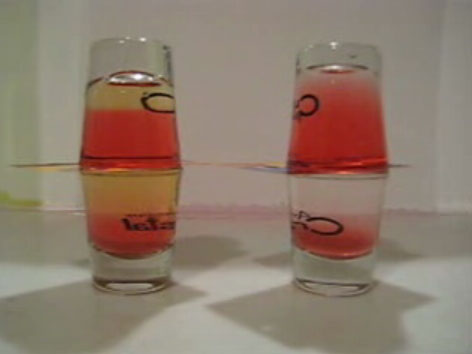Mark Halsey is a licensed therapist, founder, and chief editor of Clean Break Recovery. With over a decade of addiction treatment experience, Mark deeply understands...Read more
It’s a question that has been debated for years: Is alcohol lighter than water? We’ve all heard the old saying that “oil and water don’t mix” and it seems that the same could be said for alcohol and water. But what is the truth? In this article, we will dive into the science behind the question and uncover the surprising truth about whether alcohol is lighter than water. So, grab a cup of coffee and let’s get started!

Contents
- Comparing Weight of Water vs. Alcohol
- Frequently Asked Questions
- Question 1: Is Alcohol Lighter Than Water?
- Question 2: What Is the Specific Gravity of Alcohol?
- Question 3: How Is Alcohol Weighed?
- Question 4: Does the Temperature Affect the Density of Alcohol?
- Question 5: Does Alcohol Float on Water?
- Question 6: How Does the Density of Alcohol Compare to Other Liquids?
- What happens when you drink RUBBING ALCOHOL?
Comparing Weight of Water vs. Alcohol
Alcohol and water are two of the most common liquids found in households around the world. When comparing the weight of water vs. alcohol, it can be seen that the difference between them is quite vast. The answer to the question “Is alcohol lighter than water?” is no. Water is heavier than alcohol, and this article will discuss the reasons why.
The first reason why water is heavier than alcohol is due to the density of the two liquids. Water is denser than alcohol, meaning that it has more mass in the same amount of volume. This means that a given amount of water will weigh more than the same amount of alcohol. For example, the density of water is 1 g/cm3, while the density of alcohol is 0.79 g/cm3. This difference in density is why water is heavier than alcohol.
The second reason why water is heavier than alcohol is because of its molecular structure. Water consists of two hydrogen atoms and one oxygen atom, while alcohol consists of one carbon atom, two hydrogen atoms, and one oxygen atom. This means that water molecules are larger than alcohol molecules, which also contributes to water being heavier than alcohol.
Effect of Temperature on Weight of Water vs. Alcohol
In addition to the differences in density and molecular structure, the weight of water vs. alcohol can also be affected by temperature. When water is heated, its molecules move closer together, which increases its density. On the other hand, when alcohol is heated, its molecules move apart, which decreases its density. This means that the weight of water will increase when it is heated, while the weight of alcohol will decrease.
Furthermore, the boiling point of alcohol is lower than that of water. This means that when water is heated to its boiling point, alcohol will already have evaporated. This further contributes to the fact that water is heavier than alcohol.
Conclusion
In conclusion, when comparing the weight of water vs. alcohol, it can be seen that water is heavier than alcohol. This is due to the differences in density and molecular structure between the two liquids, as well as the effects of temperature. Thus, the answer to the question “Is alcohol lighter than water?” is no.
Frequently Asked Questions
Question 1: Is Alcohol Lighter Than Water?
Yes, alcohol is generally lighter than water. Alcohol molecules are smaller than water molecules, and less dense. This means that a volume of alcohol weighs less than the same volume of water, and is thus lighter.
Question 2: What Is the Specific Gravity of Alcohol?
The specific gravity of alcohol depends on the type of alcohol. For example, the specific gravity of ethanol (the type of alcohol found in beverages) is 0.789, while isopropyl alcohol (the type used in cleaning products) is 0.785.
Question 3: How Is Alcohol Weighed?
Alcohol is weighed in a variety of ways, depending on the type of alcohol and the purpose for which it is being weighed. It can be weighed by volume or by mass. For example, beer and wine are often weighed by volume, while spirits and liqueurs are typically weighed by mass.
Question 4: Does the Temperature Affect the Density of Alcohol?
Yes, the temperature of alcohol affects its density. As the temperature increases, the density of alcohol decreases, and vice versa. This is due to the fact that when alcohol is heated, its molecules move faster and spread out more, making it less dense.
Question 5: Does Alcohol Float on Water?
Yes, alcohol will float on water since it is less dense. This is because alcohol molecules are smaller and less dense than water molecules.
Question 6: How Does the Density of Alcohol Compare to Other Liquids?
The density of alcohol is generally lower than most other liquids, such as oils and most solvents. However, some liquids, such as glycerol, are even lighter than alcohol.
What happens when you drink RUBBING ALCOHOL?
In conclusion, it is safe to say that alcohol is indeed lighter than water. This is due to its lower density and the fact that it is composed of less mass than water. This property of alcohol is why it is widely used in a variety of applications including in the production of alcoholic beverages and as a fuel source. It is important to note, however, that the effects of alcohol can be extremely damaging to the human body, so it should be consumed in moderation.
Mark Halsey is a licensed therapist, founder, and chief editor of Clean Break Recovery. With over a decade of addiction treatment experience, Mark deeply understands the complex needs of those struggling with addiction and utilizes a comprehensive and holistic approach to address them. He is well-versed in traditional and innovative therapies, including cognitive-behavioral therapy, motivational interviewing, and mindfulness-based interventions.
More Posts